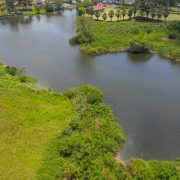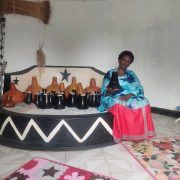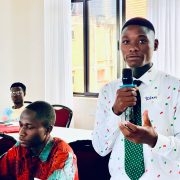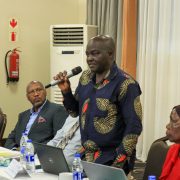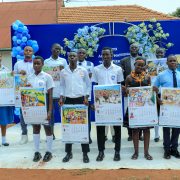Indigenous Minorities demand for respect of their cultural rights
- 3 years Ago
- 0 Comment
- 11 Min Read
The demand was made during the commemoration of the International Day of the World’s Indigenous Peoples organised by CCFU on the 9th August, 2022, in Kasese District. See full statement here
Indigenous Minority Groups demands for cultural, social economic and political inclusion as we commemorate the International Day for the World’s Indigenous Peoples
Who are the Indigenous Minority Groups in Uganda?
Of the 65 indigenous communities in Uganda, approximately 22 are minority ethnic groups, some of them with fewer than 25,000 people, such as the Bavanoma and the Napore, the Benet and the Ik, the Ethur and the Bagabu among others. We, however, collectively represent more than 1% of the national population or more than 500,000 fellow citizens. We are often singled out as marginalised groups, frequently facing several challenges limiting the enjoyment of our human rights, including cultural rights.
As the world commemorates the International Day of the World’s Indigenous Peoples, the Indigenous Minority communities in Uganda join in the celebrations and wish to highlight several human rights concerns affecting us to the government of Uganda and other relevant development agencies. The concerns are clustered under seven thematic areas below:
- Heritage and Cultural Identity
We, the Indigenous Minority Groups face challenges in expressing, accessing, enjoying and participating in the promotion of our cultural heritage. We have continuously been marginalised by dominant communities and our cultures are seldom respected. In cases where we (IMGs) have been evicted from our ancestral lands, access to our cultural resources such as herbal medicine and cultural sites that we hold dear has been a challenge. Because of our unique ways of life, dominant cultures have used derogatory words to describe us. For example, the Benet (Mosopsyek) have been referred to as the Ndorobos, meaning primitive. And whereas CSOs have tried to document our unique ways of life, languages and oral history, our identity is still at stake because our languages are not appreciated and used in public spaces including schools, and artefacts are not represented in the National Museum as part of our own.
We, therefore, call upon colleagues from the majority communities to respect our cultural rights. We call upon the Uganda Wildlife Authority and the National Forest Authority to allow us to identify, access and document our denied cultural resources found in gazetted government areas. For example, the communities in Obongi district (Gimaras and Relis) should be allowed to access cultural sites inside Zoka Forest Reserve. IMGs should be allowed to speak their languages in various public places. The Department for Culture and Family Affairs and the Department of Museums and Monuments should build the capacity of IMGs to document their cultural resources and establish IMGs-specific museums. Science and innovation should also be applied in the development of our medicinal herbs so that our culture is appreciated and preserved.
- Cultural rights and the extractive industry
One common feature of the extractive industry just like the conservation of wildlife is that it has affected mainly the Indigenous Peoples. In Uganda, oil and gas and gold mining have mainly affected the Bagungu in Buliisa, the Tepeth in Moroto and the Ik in Kaabong.
Bagungu community has suffered from the involuntary relocation of their sacred natural sites despite the fact that their culture dictates that they are immovable and the taking of land for oil and gas activities has also affected their life as the land-dependent people where they drew their building materials, wild fruits and herbs. The Ik and the Tepeth also have been negatively affected by gold and lime mining respectively where they have faced forced displacement from their ancestral land and made to work under poor conditions i.e., underpaid, work without Personal Protective Equipment (PPE) and, their sources of water polluted.
We, therefore, demand for timely and adequate compensation for the affected people and their community in cases of land evictions. The extractive companies should respect and support the cultural heritage of minorities through documentation and the establishment of community museums. Oil and gas and mining companies should provide acceptable working conditions for their employees. Dialogue on degazetting part of conservation areas like national parks, forests, and wildlife reserves and extension of buffer zones should be held with IMGs.
- Access to cultural resources in protected areas
Whereas UWA’s responsibility in part, is to conserve, economically develop and sustainably manage wildlife in protected areas in partnership with neighbouring communities, access to cultural resources by IMGs in protected areas remains a big challenge. Resources such as indigenous medicine, water, shrines, burial sites, caves, and soils for performing certain rituals and construction materials are not adequately accessed by IMGs. This is a common challenge experienced by all IMGs adjacent to the National Parks or Forest Reserves. In cases of human-wildlife conflicts, lives and property are lost without timely and adequate compensation. Most of the budget provisions under the revenue sharing scheme of UWA do not take care of the concerns of IMGs. The 20% allocated is still very small to address our challenges. IMGs are rarely recruited to work as UWA and Forest rangers/village scouts. They are also not recruited to work as tour guides at national tourism destinations.
UWA and other conservation agencies should sign and respectfully operationalise MoUs with IMGs adjacent to Protected areas, allowing them to access important cultural resources. UWA and other conservation agencies should involve the IMGs in the management of protected areas. UWA should revise its policy on compensation in case of human-wildlife conflicts and property loss. Compensation should be immediate and adequate enough to take care of the lost property and medical bills. The revenue sharing scheme should be revised to 30%. Half of the 30% should go directly to IMGs to implement income-generating activities. There should be justice and fairness during the recruitment of ranges and tour guides. At least, a certain quota should be allotted to IMGs. UWA should sensitise IMG communities on the existing wildlife conservation laws and policies.
IMGs and Sports
Government should support IMGs to access areas needed by athletes when they are training particularly in the Sebei region. The government should also invest in sports tourism as a source of income for the IMGs especially the Benet. UWA should allow athletes to access certain foods/honey and medicine from the Park.
- Livelihoods interventions for IMGs
Access to decent, meaningful and sustainable livelihoods by IMGs is affected by several challenges such as the lack of voice because of the low population of IMGs which suppresses their confidence, and limits them from advocating for access to government livelihood interventions; exclusion of IMGs from livelihood programmes’ committees which affects the IMGs ability to access those facilities; the lack of preparedness with the required documentation to access livelihood programmes and the lack of access to resources such as land which can be used for livelihood projects such as farming. IMGs also lack of hands-on skills to start livelihood projects and to seek employment
In light of the above, we demand special consideration and affirmative action under the livelihood programmes such as Emyooga, Youth Livelihood Programme, Parish Development Model, and Uganda Women Entrepreneurship Programme. Government should respond to legally binding decrees such as the August 2019 Equal Opportunities Commission Order to resettle the Banyabindi in Kasese and the Court Order to resettle the Benet. Government should complete the resettlement programmes with complete land titles for IMGs who are evicted from their ancestral homes such as in the case of the Basongora and the Benet who have been resettled without land titles. The government should support the youth and women from IMG communities with increased access to specialised financial services.
- Access to relevant education and IMG languages
Many IMGs live in remote areas, with scant infrastructure. There are for instance currently only 5 primary schools and one secondary school for the population of 14,000 Ik. Some local languages have been introduced in lower primary schools but minority languages are unlikely to be taught, given the absence of teaching materials and trained teachers (or of the opportunity and freedom to teach in local languages). Children from IMG communities are then taught in ‘foreign’ languages, and so the minority language is threatened. In Bundibugyo, learner materials are written in Lukhonzo and the Lendu and Kebu learn in Alur. Similarly, Batuku children learn at school in Rutooro and among the Benet, Kupsabiny is taught in the schools, resulting in the loss of Kumosop, the Benet language.
In light of the above situation, we demand the government of Uganda through the District Education Officers, District Councils and District service commissions to support the inclusion of IMG languages among the languages taught in primary schools. We need to be co-opted on the District Language Boards for proper development and documentation of our languages. We also demand that our children who are teachers be posted to teach in primary schools where IMGs children are the majority. We also demand access to government scholarships as IMGs.
- Political Inclusion and Representation
Reference is made to article 32 and article 21 of the 1995 constitution which provide for affirmative action and equality before the law and in all spheres of life such as political, economic, social and cultural life. Against this background, IMGs of Uganda are equally entitled to these rights and henceforth demand representation at parliamentary levels and local governments. We are about 500,000 people covering the following groups, Batwa, Bavanuma, Bamba and Babwisi in Bundibugyo, Basongora, Bagabu, Bakingwe, Banyabindi and Bakingwe in Kasese, Nyangia, Napore, Katibong, Ik, Tepeth, Ethur and Ngokutio in Karamoja and the Kebu, Lendu, Gimara and Relis in Zombo and Obongi districts respectively. The lack of representation affects our access to government development interventions. It also affects our self-esteem and identity as a people. Currently, the annual reports by government agencies such as the Uganda Human Rights Commission and the Equal Opportunities Commission do not explicitly talk about the human rights concerns of IMGs.
Whereas there is a degree of political representation among the Ik, Nyangia and Basongora, it is still small compared to the population of IMGs in Uganda. We, therefore, demand that there should be a representative of individual IMG in local councils if there exists that minority in that district. Regarding inclusion in opportunities for employment, we demand 10% of the appointment on the District Land Board, Public Accounts Committees and District Service Commissions. We also demand the inclusion of IMGs such as the Bagabu, Benet, Maragori, Bakingwe and Ngiiyen in the 1995 Constitution of Uganda. We further demand that the human rights/cultural rights concerns of IMGs are explicitly reported on in the annual reports to Parliament by the Uganda Human Rights Commission and the EOC.
- Land and Boundaries
Some of the IMGs still live inside or near protected areas such as National Parks and Forest Reserves. The boundaries between IMGs’ land and conservation areas are still not yet clear. Even in cases where the boundaries are clear such as in Kidepo, the wild animals still cross to gardens of IMGs and destroy their crops. The recently created boundaries between IMGs communities and the neigbouring majority communities are yet to be operationalized. In many cases, boundaries created during colonialism are still followed which has created several challenges particularly, between the Ik and the Dodoth communities and between the Jies and the Nyangia. Previously, the Bagabu used to stay on the islands of Lake George, however, when they were relocated to the national park, the size of the land given to them was not specified and boundaries between the community and the Queen Elizabeth National Park are not clear. Among the IMGs there is limited awareness about the existence of land-related policies and laws which brings about several conflicts related to land. Some areas were gazetted as wildlife conservation areas without the consent of the local communities and have lodged complaints for these areas to be degazetted.
We, therefore, demand that the government through the district land boards and in collaboration with other relevant stakeholders such as UWA, NFA and the Uganda Land Commission should re-survey and open boundaries as of 1924 of the land belonging to IMGs and correct the anomalies thereof. In areas boundaries between the Park and the community land are clear, UWA should use high voltage electric fences, trenches, walling, etc. to protect IMGs farmland from problem animals. The government through its relevant agencies such as the ULC, UWA & NFA should sensitise communities about the existing land laws and policies. Government should listen to complaints and implement the Benet consent judgment of 2005.
Signed by:
…………………………………………………………………
Samuel Lobeka
Chairperson, northern Karamoja Indigenous Minority Group platform
…………………………………………………………………..
Wilson Mubulya
Chairperson, Rwenzori Indigenous Minority Group platform
August, 9th 2022https://crossculturalfoundation.or.ug/ccfu/2022/08/09/indigenous-minorities-demand-for-respect-of-their-cultural-rights/



